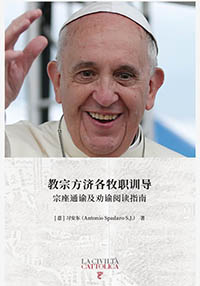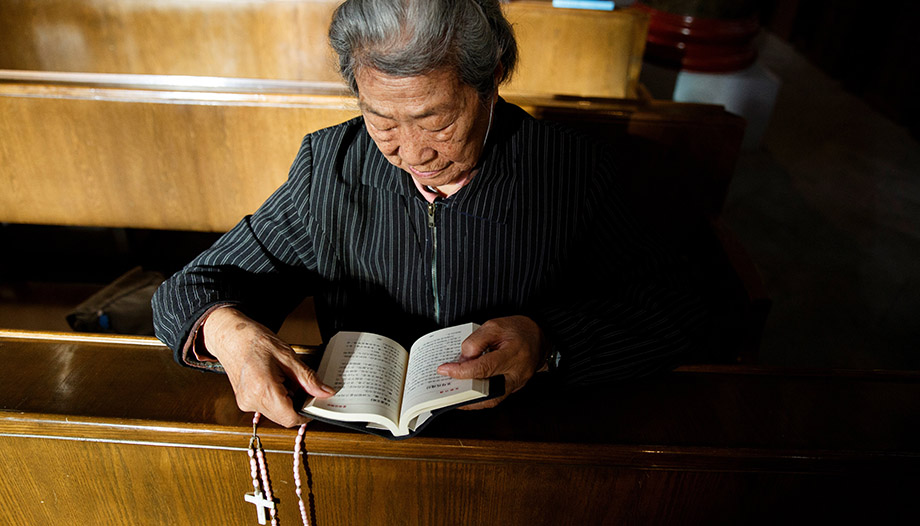In China "there is a whole living network of prayers, liturgies, catechesis and pastoral initiatives directly inspired by the ordinary Magisterium of Pope Francis".
These are the words of Cardinal Luis Antonio Cardinal Gokim Tagle, Pro-Prefect of the Dicastery for EvangelizationThe Chinese language version of these remarks, delivered a few days ago at the presentation of a book in Chinese titled "The Magisterium of Pope Francis. A guide to reading his Encyclicals and Apostolic Exhortations." (教宗方济各牧职训导 - 宗座通谕及劝谕阅读指南) born within the framework of the magazine "La Civiltà CattolicaThe "The World of the Catholic Church" on the occasion of the tenth anniversary of Bergoglio's pontificate and edited by its director, Antonio Spadaro, SJ.

The aim of the publication is to transmit the richness of this Magisterium to bishops, priests, catechists and those who pastorally guide the Catholic communities of the great Asian nation.
"It will be received as a very welcome gift, which comes at the right time," said Cardinal Tagle, who in his speech also thanked the great work carried out over the years by the Fides Agency -which belongs to the Dicastery he directs, and which publishes weekly news on China from dozens of parishes in communion with the universal Church.
Welcoming from afar
Among the examples of this communion and adherence to the Pontiff, Cardinal Tagle cited in his speech the important mobilization of small Chinese communities for the Year of the Eucharist proclaimed in 2004 by St. John Paul II; the prayers for the beginning of the pontificate of his successor Benedict XVI; the impressive series of initiatives carried out for the special Year dedicated to the Apostle Paul (2008) or the subsequent Year for Priests, Year of Faith, etc.
With Pope Francis, Cardinal Tagle emphasized the Special Holy Year of MercyThe Pope said: "Many people went through the Holy Doors of the cathedrals. And many bishops published pastoral letters to revive the words of Pope Francis on mercy". But also the daily closeness of the Holy Father during the hard months of the pandemic: "groups of young Chinese Catholics, with their digital skills, managed to get images of the Pope's Masses into homes, along with simultaneous Chinese translations of his homilies."
Returning to the texts of the magisterial production of the current pontiff, now also "annotated" in Chinese, according to Tagle, they find "great resonance in the present condition of Chinese Catholics", precisely because Francis, besides pointing out the sources and treasures of the faith and offering pastoral and spiritual suggestions, "offers words of wisdom even in the face of the problems, trials and sufferings that affect the entire human family".
The specifics of each document
For example, thinking concretely of Chinese Catholics, from the Exhortation Evangelii gaudium four principles for social life emerge here (time superior to space, unity prevailing over conflict; reality more important than the idea and the whole superior to space), which according to the Pro-Prefect of the Dicastery for Evangelization are ideal for "enlightening and comforting the journey of Chinese Catholics in recent decades, even in the most difficult and painful passages".
The same applies to Amoris laetitiawhere, although values rooted in tradition (virtuous practices, filial love, respect for the elderly) remain among the people, "today they are undermined by the disintegration linked to models of development totally conditioned by economic interests," Cardinal Tagle stressed.
– Supernatural Gaudete ed ExultateThe Pope's message, with its universal call to holiness, can also be a tribute to those who in recent decades have guarded and transmitted the treasure of the faith from person to person and between generations: "people who witnessed and witness to their faith not with great proclamations or great events, but with simplicity, through the power of the sacraments, amid the problems of daily life, beginning precisely with family life".
China, as we know, is also not exempt from the serious environmental crisis with its consequent extreme ecological problems, and here too come to the "rescue" documents such as Laudato si' and Dear Amazonia, which are a real warning to take care of the future, rebalancing the excessive predominance of economic development alone.
Finally, Fratelli tutti, with all its load of "solutions" to the crisis and to the conflicts between men - which unfortunately persist (wars, culture of waste, xenophobia, slavery...) - and, in particular, to dissipate all those clouds of a possible confrontation between the West and China of which political analysts speak so much.
Welcome, then, are the occasions when we can foster greater mutual understanding and enable the Church to reach out with her message of hope to all those cultures that have shown themselves to be well prepared to welcome it and incorporate it into daily life.







